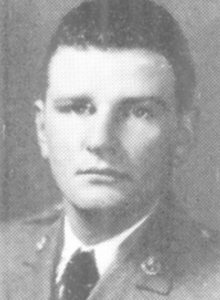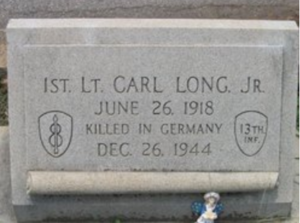Scroll of Honor – Carl Long, Jr.
Winter War
Written by: Kelly Durham
Carl Long, Jr. of Saluda attended Clemson College from 1936 to 1938, majoring in agronomy.  Following his stint on campus, Long was employed by Saluda Hosiery Mill, one of the dozens of textile plants which employed the majority of manufacturing workers in the state. A newspaper article described Long as “a promising young businessman from a prominent family.”
Following his stint on campus, Long was employed by Saluda Hosiery Mill, one of the dozens of textile plants which employed the majority of manufacturing workers in the state. A newspaper article described Long as “a promising young businessman from a prominent family.”
Long entered military service in January 1941. America’s first peace-time draft had been implemented and thousands of young men from all over the country were being called to active duty for training.
Long didn’t have far to travel. He reported for basic training at Fort Jackson, then home of the 118th Infantry Regiment of the 30th Infantry Division. Long’s next assignment was farther afield. Iceland, where he was deployed for fourteen months, must have seemed a world removed from Fort Jackson and nearby Columbia. While in Iceland, Long earned “high esteem and praise” from his commanding officer, traits which were likely factors in his being ordered to Fort Benning, Georgia for Officer Candidate School.
By this time, the war was in full swing and the Army had great need for capable young officers. Long received his second lieutenant’s commission and was next assigned to Camp Blanding in Florida and then Camp Rucker, Alabama.
He was ordered overseas and assigned to the 13th Infantry Regiment of the 8th Infantry Division which had crossed Utah Beach in early July 1944 and was then attacking the French coastal city of Brest. Long was wounded, awarded a Purple Heart, and promoted to first lieutenant for “meritorious service” in battle.
After liberating Brest, the 8th Infantry Division turned east and began a steady advance across France and into Luxembourg. By the end of November, the division had been committed to the ongoing battle in the Hürtgen Forest, inside Germany itself. In cold, wet, often snowy  weather, the 8th continued to push eastward into the teeth of fierce German resistance. Poor weather minimized the American advantage in airpower while the rugged terrain favored the well-fortified defenders.
weather, the 8th continued to push eastward into the teeth of fierce German resistance. Poor weather minimized the American advantage in airpower while the rugged terrain favored the well-fortified defenders.
On December 26, 1944, Long died of wounds suffered in Germany. He was survived by his parents, who were notified of their son’s death three weeks later. Long was also survived by his brother, grandfather, and three uncles.
For more information about First Lieutenant Carl Long, Jr. see:
https://soh.alumni.clemson.edu/scroll/carl-long-jr/
For additional information about Clemson University’s Scroll of Honor visit:
